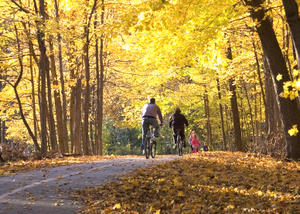Bicycling Strategy Paper Introduction
Introduction
Bicycling and walking are important elements of an integrated, intermodal transportation system. Constructing sidewalks, installing bicycle parking at transit, teaching children to ride and walk safely, installing curb cuts and ramps for wheelchairs, striping bike lanes, and building trails all contribute to our national transportation goals of safety, mobility, economic growth and trade, enhancement of communities and the natural environment, and national security. (USDOT, 1999)
 This paper will briefly introduce and define bicycling as a planning strategy, review the existing conditions and the potential for improving the conditions for bicycling in the region, and finally examine the (plausible) effects of implementing this strategy, for the region and for individual communities within the region. This paper is not intended to be a comprehensive, definitive exposition of bicycle planning and programming but rather a planning tool, intended to initiate dialogue and discussion on the possible impacts of improving bicycling conditions in our region. In this paper, we will define bicycling broadly, and consider its impacts not only on transportation, but also on health, the environment, and economic and community development. The discussion and any answers we propose will remain hypothetical and tentative, and we hope to receive input from our readers giving their opinions on our conclusions. The strategy is defined very roughly as "Improving the conditions for bicycling". Improvement could take the form of new bikeways, changes to existing transportation infrastructure to make bicycling easier and safer, new laws or ordinances protecting or promoting cyclists, educational and outreach programs designed to encourage and increase bicycling, or even enforcement programs intended to improve safety for bicyclists and other users of roadways and paths. Our research represents an attempt to answer the broad question: "What would happen, regionally and in your communities, if we improved bicycling conditions?"
This paper will briefly introduce and define bicycling as a planning strategy, review the existing conditions and the potential for improving the conditions for bicycling in the region, and finally examine the (plausible) effects of implementing this strategy, for the region and for individual communities within the region. This paper is not intended to be a comprehensive, definitive exposition of bicycle planning and programming but rather a planning tool, intended to initiate dialogue and discussion on the possible impacts of improving bicycling conditions in our region. In this paper, we will define bicycling broadly, and consider its impacts not only on transportation, but also on health, the environment, and economic and community development. The discussion and any answers we propose will remain hypothetical and tentative, and we hope to receive input from our readers giving their opinions on our conclusions. The strategy is defined very roughly as "Improving the conditions for bicycling". Improvement could take the form of new bikeways, changes to existing transportation infrastructure to make bicycling easier and safer, new laws or ordinances protecting or promoting cyclists, educational and outreach programs designed to encourage and increase bicycling, or even enforcement programs intended to improve safety for bicyclists and other users of roadways and paths. Our research represents an attempt to answer the broad question: "What would happen, regionally and in your communities, if we improved bicycling conditions?"